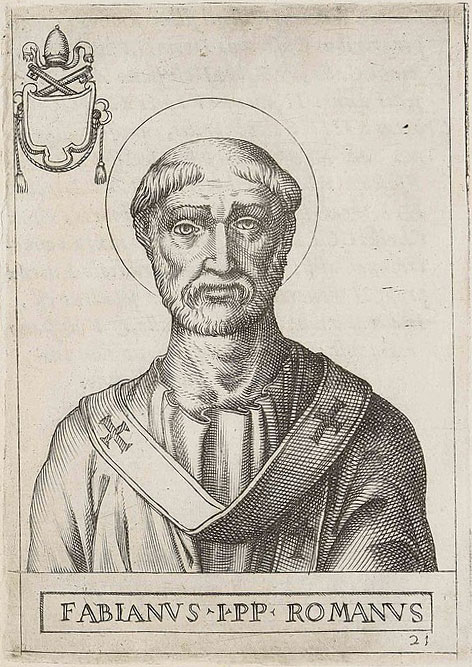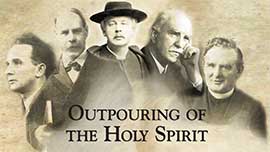DID THE HOLY SPIRIT SELECT FABIAN TO BE BISHOP OF ROME?

[Above: Giovanni Battista de Cavalieri, Pontificum Romanorum effigies, 1580.—Biblioteca comunale di Trento / [public domain] Wikimedia]
IN 236, Anteros, bishop of Rome died. Christians gathered to elect his successor. They were to witness one of the most remarkable events in the history of the papacy.
At that time the Christian communicants at Rome chose their own bishop. The college of cardinals that now chooses the pope was centuries in the future. And the bishop of Rome would not be titled “pope” for several centuries either.
Among those who gathered at Rome was Fabian, a farmer. For thirteen days the church discussed which of several eminent Christians should be chosen as their next leader. Suddenly a dove flew down and landed on the head of Fabian. This was so like what happened at Christ’s baptism, when the Holy Spirit descended on him like a dove, that the crowd took it as a heavenly sign. “Upon this,” wrote church historian Eusebius, “the whole body exclaimed, with all eagerness and with one voice, as if moved by the one Spirit of God, that he was worthy; and without delay they took and placed him upon the episcopal throne.”
And so, on this day, 10 January 236, Fabian became bishop of Rome. To the end of his life he served as a worthy leader of the church. Among his many actions, he arranged missions to Gaul (modern France). A letter attributed to him shows his concern for souls:
We beseech you also to be zealous in praying in your pious supplications, that our God and Lord Jesus Christ, who will have all men to be saved, and no one to perish, may, by His vast omnipotence, cause their hearts to turn again to sound doctrine and to the Catholic faith, in order that they may be recovered from the toils of the devil who are held captive by him, and be united with the children of our mother the Church.
Fabian also organized the church’s charitable work in Rome. He condemned heresies, but ironically ordained Novatius as priest. (Novatius would later be involved in a schism over the treatment of lapsed Christians.)
The bishop took a keen interest in past martyrs. He initiated repairs on the catacombs where many Christians had been buried, appointing notaries to collect and authenticate accounts of those who died for Christ’s sake. He prevailed on the Roman government to exhume and return the bones of two famous Christian martyrs. Bishop Pontian and his rival Hippolytus had died for their Christian witness while exiled to hard labor in the mines at Sardinia. Fabian’s interest in martyrs was fitting, for he was about to become one himself.
A Greek inscription in the Catacomb of St. Callixtus reads “Fabian, Bishop, Martyr.” Emperor Decius demanded all Christians leaders offer incense to the idols of Rome. Fabian refused. Arrested, he perished in captivity—possibly decapitated. At any rate, he died on 20 January 250, fourteen years and ten days after his unusual elevation to the highest church office in Rome.
Cyprian, the notable bishop of Carthage, who would himself die as a martyr, wrote to the Romans in praise of Fabian:
I greatly congratulate you that you honor his memory with so public and illustrious a testimony. . . . For just as the fall of a bishop tends to bring about the ruinous fall of his followers, so it is a useful and helpful thing when, by the firmness of his faith, a bishop becomes manifest to his brethren as an object of imitation.
—Dan Graves
----- ----- -----
The Holy Spirit has worked powerfully many times in church history. One instance is documented in Outpouring of the Holy Spirit. Watch it at RedeemTV.
Outpouring Of The Holy Spirit can be purchased at Vision Video.







